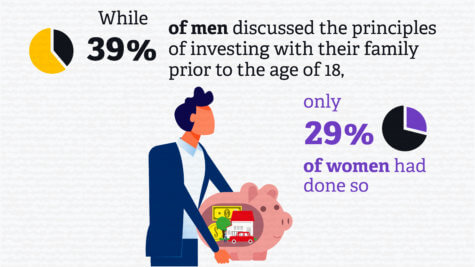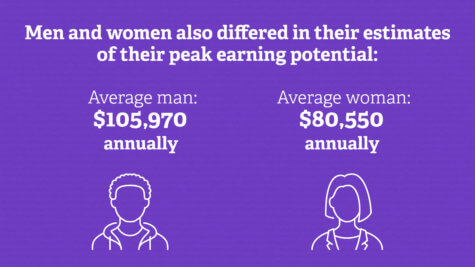NEW YORK — When it comes to talking about money, a new survey finds some women even run into a “glass ceiling” in their own homes. Six in 10 American women say they’ve been condescended to about their financial situation at some point.
The OnePoll study of 2,000 people – 1,000 men and 1,000 women – revealed the differences in how the genders are taught to think about finances from a young age. While 39 percent of men discussed the principles of investing with their family prior to the age of 18, only 29 percent of women did so as well.
Men (31%) were also more likely than women (19%) to have discussed how to negotiate a salary by this age. This might have had consequences for self-perception of financial power down the road, particularly in terms of projected salary.
When asked to estimate what they imagined their peak earning potential could be, the average male respondent believes he can make $105,970 per year. The average female respondent, on the other hand, thinks her highest potential salary taps out at $80,550. It’s a finding eerily similar to the oft-cited wage gap statistic, that women earn 80 cents for every dollar men make in the United States.
Is debt a gender issue?
 Commissioned by Charlie Finance, the study also examined the differences in how men and women deal with debt. Although men and women were about equally likely to have discussed when to take on debt (21% vs. 15%), as well as how to pay it off (18% vs. 14%) with their parents, that’s where the similarities end. On average, women have more debt than the average man — $48,184 compared to $43,566.
Commissioned by Charlie Finance, the study also examined the differences in how men and women deal with debt. Although men and women were about equally likely to have discussed when to take on debt (21% vs. 15%), as well as how to pay it off (18% vs. 14%) with their parents, that’s where the similarities end. On average, women have more debt than the average man — $48,184 compared to $43,566.
Yet when it comes to confidence in their ability to pay off debt on a reasonable timeline, only seven in 10 women agreed that they felt capable of this. Meanwhile, 84 percent of men think they can pay down debt quickly.
“Debt management is something that most people struggle with. Women, more so than men, are often made by society to feel that they don’t have the ability to tackle their debts,” says Illian Georgiev, Co-Founder & Chief Executive Officer of Charlie Finance, in a statement.
“The best way to incentivize change is by celebrating people’s savings and any steps they take towards becoming debt-free. This positive reinforcement helps keep them motivated and on track for long-term success.”
Debunking the myths about women and money
 While the data about debt may reinforce old stereotypes about women being bad with money, several stats directly contradict this myth. Contrary to stereotypes, adult men (63%) are more likely to report being called “risk-averse” when it comes to their finances than women (45%). Moreover, men are more likely to say that they had felt undermined in negotiations involving money – 65 percent compared to only 55 percent of women.
While the data about debt may reinforce old stereotypes about women being bad with money, several stats directly contradict this myth. Contrary to stereotypes, adult men (63%) are more likely to report being called “risk-averse” when it comes to their finances than women (45%). Moreover, men are more likely to say that they had felt undermined in negotiations involving money – 65 percent compared to only 55 percent of women.
“It’s important to not let anything get between you and your goals, whether that be stereotypes, a lack of education, or a low-income starting point,” adds Ivo Parashkevov, Co-Founder of Charlie Finance.
“Don’t let other people influence your solutions—if saving to you means putting away an extra dollar every time you buy Starbucks, that’s okay! That may work better for you than trying to cut out things you enjoy. The aim should be to simply find whatever helps you get one step closer to achieving your financial goals.”
